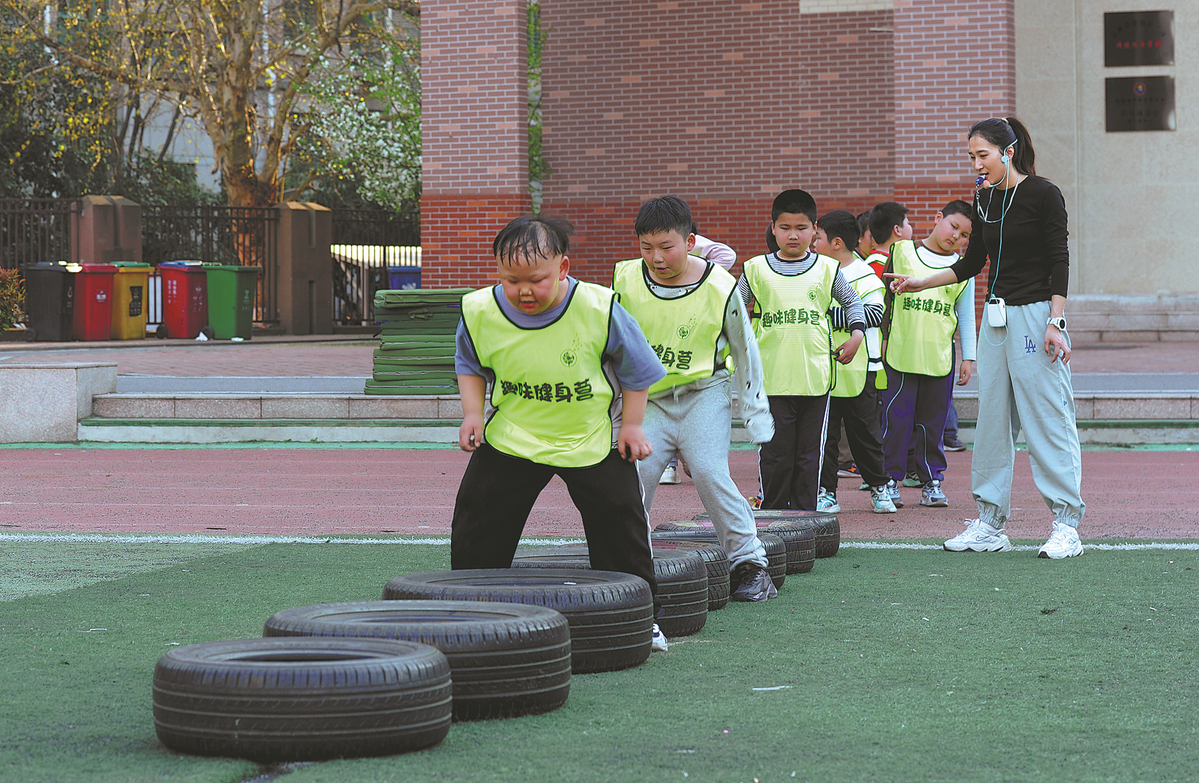With child weight gain on the rise, hospitals innovate
Doctors prioritize diet and exercise and mental health


Time for action
In March, the National Health Commission called for concerted support for a three-year action plan to promote weight management among the public.
During the annual gatherings of the National People's Congress and the National Committee of the Chinese People's Political Consultative Conference, or two sessions, "weight loss" became a trending topic on social media.
Wang Xiaowen, director of the outpatient department at Wuhan Children's Hospital, said that while the prevalence of obesity among children is gradually increasing, parents' awareness of health is also improving.
"I believe this is a positive development. The medical approach for obesity is shifting from disease treatment to health management, emphasizing prevention before diseases occur, which I find very meaningful," Wang said.
"The consequences of obesity are numerous," Wang explained. "These include not only the 'three highs' — hypertension, hyperglycemia, and hyperlipidemia — but also high blood pressure, elevated blood sugar, high uric acid levels and high blood lipids, which can lead to cardiovascular and cerebrovascular diseases. This is an excellent opportunity to promote weight management across the country."
Medical institutions across China have taken significant steps in response to the growing obesity crisis.
On March 18, the Capital Institute of Pediatrics launched the Medical Weight Management Center.
In Jiangxi province, the Second Affiliated Hospital of Nanchang University established the Obesity Weight Loss Center, also known as the Jiangxi Province Obesity Alliance, which saw participation from over 20 regional hospitals.
Additionally, Jiangxi will introduce several multidisciplinary obesity weight loss clinics to offer patients comprehensive treatment plans for weight loss.
Liu Jianping, director of the Jiangxi center and head of the Department of Endocrinology and Metabolism at the Second Affiliated Hospital of Nanchang University, emphasized that managing obesity is a multidisciplinary effort.
She said, "The center not only involves the endocrinology department but also incorporates specialists from nutrition, rehabilitation, traditional Chinese medicine, psychology, gastrointestinal surgery and digestive health, creating a collaborative treatment model."
According to the obesity diagnosis and treatment guidelines released by the National Health Commission last year, a multidisciplinary team (MDT) treatment model can effectively enhance the diagnosis and treatment of obesity, providing personalized plans for patients.
Liu's hospital, like many others across China, opened three specialized clinics on March 18: an obesity and weight loss clinic, an obesity follow-up clinic and an obesity assessment clinic.
Six doctors are available for consultations three days a week, according to Liu.
"Now there are more overweight individuals than in previous years. From the beginning of the year to the end of March, our hospital has treated over 500 patients with obesity-related conditions," she said.
She also emphasized that adolescents and children require a multidisciplinary approach to address weight issues, as treatment for these groups demands more time and patience compared to adults.
For adults, lifestyle changes tend to yield better results due to their higher self-discipline and adherence to treatment plans. Liu noted that adults also benefit from a wider range of weight management tools, including the five government-approved weight loss medications available in China.
In contrast, childhood obesity is approached differently, according to Liu. Medical and surgical interventions, such as gastric bypass, are rarely advised. Instead, doctors emphasize professional dietary guidance and other behavioral adjustments.
The doctor also pointed out that minors are still developing physically and emotionally, making them more psychologically vulnerable. Obesity can lead to low self-esteem, and parents may not always fully understand their children's struggles. As a result, effective weight management for children requires a joint effort from parents, schools and healthcare professionals.
Recently, a 13-year-old girl came to see Liu for weight loss, weighing over 100 kg.
"When the child arrived, I noticed that she was reluctant to talk, and her parents struggled to understand her feelings. They focused on her weight, believing that she was too heavy and didn't look good. I told the little girl, 'With your fair skin, if you lose some weight, you could be quite beautiful.' After hearing this, she looked more confident and was more willing to talk," Liu said.
As time passed, the girl began to confide in Liu during her treatment, and "her confidence grew. I hope that parents and doctors pay more attention to the psychological well-being of children, as they are more sensitive and their emotional resilience is typically not as strong as adults".
During treatment, it is also essential to increase the variety and duration of exercise and to address sedentary habits.
Zhou Ying's daughter turned 18 this year and is in her senior year of high school. Last year, during a school physical examination, her weight exceeded 90 kg.
"My daughter has been slightly overweight since she was little. While living at school, she developed a fondness for drinking milk tea and eating too much meat, often indulging in unhealthy foods from outside, and was lazy about doing exercise," said the 52-year-old.
On April 14, Zhou took her daughter to Liu for help. In addition to adjusting her diet and receiving medication, Zhou decided to encourage her daughter to cycle and engage in more physical activity.
"She doesn't enjoy exercising, and after studying, she typically lies in bed playing on her phone. I decided to encourage her to be more active, so now we ride bikes together every day, covering a round trip of over 40 kilometers," said the mother.
"Surprisingly, she has embraced this routine, and it has slowly become a habit for her."
























